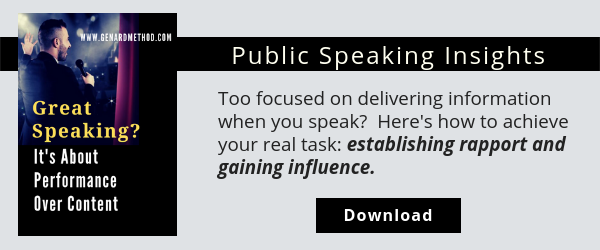
You already know storytelling is essential to moving audiences. But did you realize it can transform your speaking abilities in this way?
I recently witnessed a Dr. Jekyll-and-Mr.-Hyde moment taking place in a keynote speaker. Actually, it was a back-and-forth situation. The speaker, an energy executive, went from detached to dynamic and back again in his speech, depending upon what he was talking about at that moment.
Robert Louis Stevenson titled his novella Strange Case of Dr. Jekyll and Mr. Hyde. So I think I'll refer to this keynoter as The Strange Case of the Speaker Who Used Storytelling (Sometimes).
Ready to raise the bar on your own speeches and presentations? Discover how to optimize your natural talents as a communicator. Get the practical handbook with 101 tips for boosting your confidence, credibility, and charisma.
Learn actor-based techniques for gaining greater stage presence and influence. How to Give a Speech is your portable speech coach. Download a free chapter today!
.gif?width=190&name=HowToGiveASpeech-2016-2nd-edition-cover-3D-300x531%20(1).gif)
You've guessed it by now, haven't you? — When this speaker was telling a story, he was at his best: sharing, connecting with listeners, showing the beneficial side of his speaking nature. Otherwise, he inhabited a dimmer place filled with industry statistics, trends, and bromides.
If you're thinking the latter was horror inducing, you're right.
At the same time, it was amazing to me how much the storytelling side to this speaker's keynote transformed him. We all know that telling a story is an essential technique for engaging and moving audiences. What was surprising to me was the instantly obvious influence it can have on the speaker himself or herself.
Getting Into the 'Space' of Telling a Story
I only knew about this speaker because a client had suggested watching him. Typically, I'll ask someone I'm coaching to find speakers he or she thinks are excellent and to provide a URL so we can watch them together. I'm interested in what my client likes about this speaker in terms of their own speaking. And if the model speaker is in the same industry as my client, we can both gain insights about what constitutes effective speaking in that sector.
Of course, as a speech coach, my job is to share what I think makes the speech succeed, and also if appropriate, what can be improved. So it was with the speaker we were watching online.
Do you know about the power of emotion to help you connect with an audience? Discover how you can use emotion to persuade, move, and activate listeners. Take a look at my article on How to Achieve Emotional Power in Speeches and Presentations.
My client had asked me, "How do you get into the space of telling a story?" and we were observing the keynote speaker because he has a reputation of being a good storyteller. But as I say, it was a hit-and-miss affair.

How Storytelling Can Transform You as a Speaker
But how I liked my client's question, about getting "into the space" of telling a story! And how interesting it was to see this speaker come in and out of that space.
It was clear immediately to me which parts of his talk the presenter himself was interested in, and which sections contained data he felt he had to deliver. His entire demeanor changed! Dr. Jekyll told engaging stories; while Mr. Hyde delivered obligatory results now and again.
What a perfect example of how performance plays out in a speech and can change the persona of the speaker himself. To use a different metaphor, it was as though the speaker was plugging and unplugging himself into an outlet, brightening or growing dimmer each time. (Body language played a role, of course. Here are 6 ways to improve your own body language for public speaking.)
The transformation?— His face changed, as his habitual frown became a smile. His hands let go of the lectern and began to gesture. Of course! Now that he was interested himself in what he was saying, he couldn't fully express his thoughts without gesturing to make them stronger—the very reason we gesture in the first place. Stories, in other words, gave this speaker the opportunity to use the nonverbal communication that is essential to dynamic speaking. It was a huge step toward his communicating memorably, even apart from the engagement storytelling elicits from audiences.
Are you missing out on getting into the space to tell your own stories? If you are, audiences will certainly miss out on the best of you as a speaker, though they may not realize it. But you'll miss out too on an important element of your liveliness and effectiveness. And now you'll know it.
You should follow me on Twitter here.



